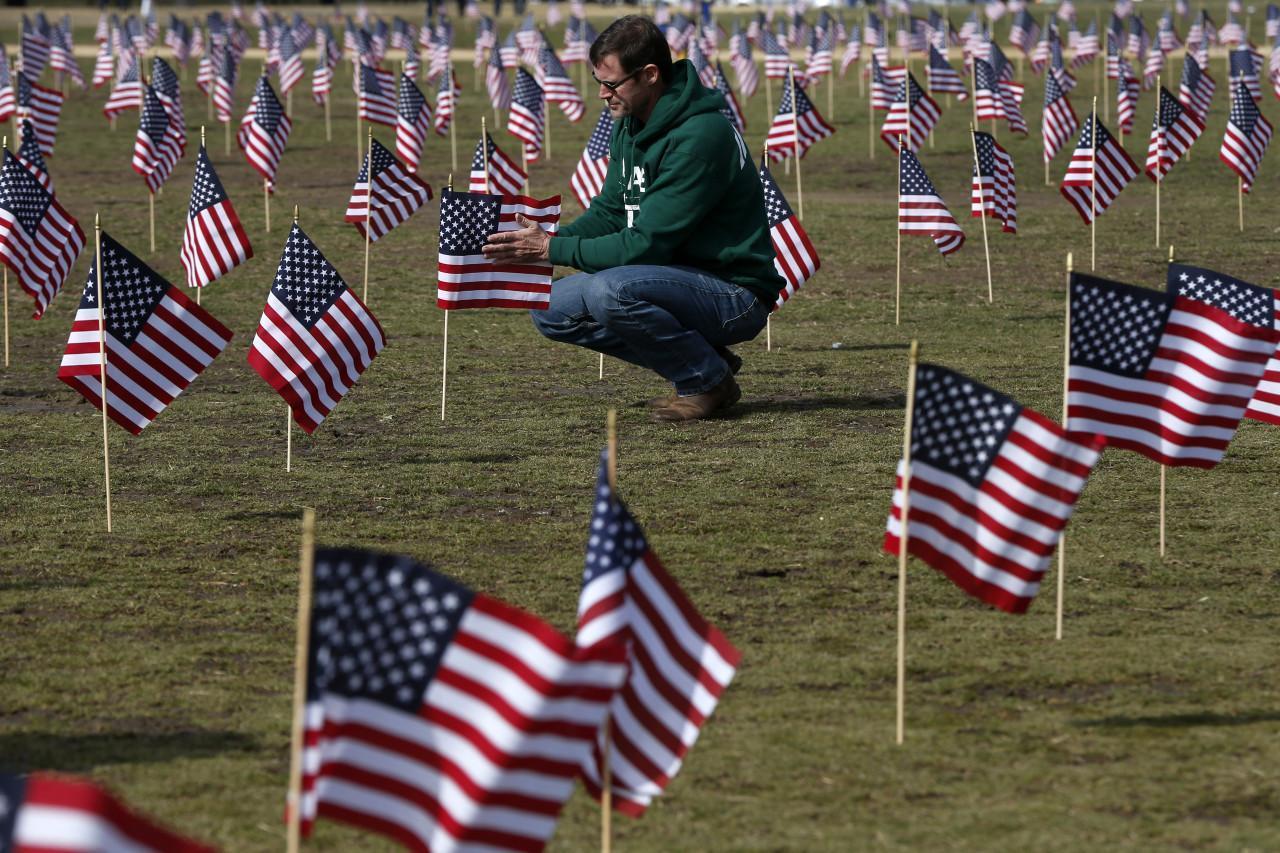Advertisement
'The Invisible Front': Our Military and Mental Health
ResumeWith guest host John Harwood.
On Veterans Day, the fight to save soldiers from PTSD and suicide. Plus, a conversation with Seth Moulton and Lee Zeldin, two Iraq War veterans just elected to Congress.

It's Veterans' Day — when we honor those who've served our country in the Armed Forces. But the meaning of the obserance is changing as we move further away from the era of universal military service. The small number of soldiers we depend on bears larger and larger burdens — not just in combat, but afterward through debilitating post-traumatic stress that has provoked a rising number of suicides. We'll talk to a general who lost two sons, an author and two veterans-turned-Congressmen about what we can do. This hour, On Point: helping veterans overcome PTSD.
-- John Harwood
Guests
Yochi Dreazen, Managing Editor at Foreign Policy Magazine. Author of "The Invisible Front: Love and Loss in an Era of Edless War." (@YochiDreazen)
Maj. General Mark Graham, Director of Vets 4 Warriors. Senior Director of Rutgers Behavioral Health Care Call Center.
From the Reading List
Washington Post: The Twin Tragedies of an Army General’s Family, Laid Bare -- "After losing his two sons, Graham was the the top commander on base as it grappled with a suicide problem. Seeking to change the culture about how suicide was viewed at Carson, he used his authority to make sure that all soldiers who died received full military funerals and memorial services, whether killed in combat or through suicide. The decision wasn’t popular with everyone, but he stood his ground. The general now runs Vets4Warriors, a hotline staffed by veterans to take calls from active-duty troops. It is funded by the Defense Suicide Prevention Office, which was established by the Pentagon in 2011 to grapple with the military’s broad problem with suicide."
Foreign Policy: Suicide Mission: Ty Carter Fought in Afghanistan and Became a Hero. Now He Has One More Enemy to Fight: PTSD — "Gradually Carter came to accept that he had post-traumatic stress disorder, or PTSD. The signature wound of the wars in Iraq and Afghanistan, post-traumatic stress has been linked to, among other fallout, a suicide epidemic that has taken the lives of more than 2,500 U.S. troops since the conflicts began. But this isn't unique to American soldiers: PTSD also affects those in the Israeli, British, and Canadian militaries, among many others, though at rates far lower than in the United States. That's because few other militaries in the world have been continuously at war for so long or have sent their sons and daughters off to fight on distant battlefields as often. British troops have fought alongside American ones in Iraq and Afghanistan, though for shorter amounts of time and often in less dangerous parts of the two countries. A recent study by researchers at King's College London found that just 2 to 5 percent of British war veterans experienced symptoms of PTSD, a fraction of the 21 to 29 percent among U.S. troops."
Business Insider: How the Military Can Cope with the Mental-Health Effects of a Decade at War — "I think in some ways the military doesn’t understand the civilian world and the civilian world doesn’t understand the military. I think the gap between the two is really heartbreaking and potentially kind of dangerous in the long term. Part of it is that only 1% of the country serves. But part of it is that that 1% doesn’t live in the major cities, for the most part. It’s clustered in the South or in the Midwest. The bulk of the country that lives in cities probably will never meet somebody who serves, or, if they meet them, they won’t have them as a close friend or family member."
A Conversation with Two Iraqi War Veterans Just Elected to Congress
Lee Zeldin, Republican Congressman-elect for New York's 1st District. Former Army Major, currently a Major in the Army Reserves. (@leezeldin)
Seth Moulton, Democratic Congressman-elect for Massachusetts' 6th Congressional District. Former Marine Corps Captain. (@Seth Moulton)
An Excerpt from "The Invisible Front"
This program aired on November 11, 2014.